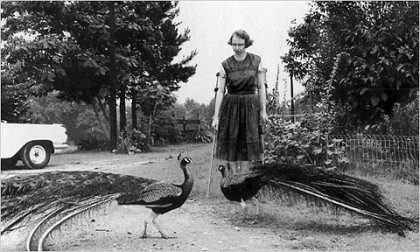Me? A Whitewashed Sepulcher?
Devra Torres | Oct 13, 2016 | 5 cmts
I've been reading the Bible with my kids (which I highly recommend, if only for the entertaining conversations it keeps on provoking), and something struck me about God's pedagogy.
It's not just that He takes a gradual approach: from external observance to internal conversion, from ritual purity to purity of heart. From the objective to the subjective, you could say. Salvation History 101.
What struck me this time is that history is played out over and over in His dealings with each of us, too.
After arranging the People's miraculous escape from the land of Egypt, He drills the Law into their heads: right and wrong, true and false, good and evil. Thou shalt not kill. Thou shalt not steal. Regardless of what's going on inside you, it is what it is. As Flannery O'Connor puts it, "The truth does not change according to our ability to stomach it."

Then, with the New Covenant, He shines an ever-intensifying spotlight on the interior--on what goes on within the person. It's not that He abandons the Law's objective requirements--in fact, He sharpens and clarifies them (as with polygamy and divorce). Nor does he allow us to jettison the law with the convenient excuse that, after all, what goes on in the heart is so much more significant than any petty list of rules and regulations. Condemning adultery "in the heart" doesn't suddenly confer a stamp of approval on the old-fashioned bodily kind. Rather, God digs deeper into the Law's significance and invites us to join in the excavation project.

The Old Covenant, of course, is replete with hints about the importance of the interior. After all, if the caricature of the "God of the Old Testament" were accurate and He were only concerned with loading His People down with rules and regulations, what's the prohibition of the invisible, interior sin of coveting doing there, hogging a full twenty percent of the Ten Commandments? And the longsuffering and compassionate God revealed by Isaiah and Hosea is hardly a petty bureaucrat.
But it's a matter of pedagogy. You have to learn what the rules even are before you can move on to obeying them in the right spirit.
Jacques Philippe, in Searching for and Maintaining Peace, explains how to move from even wanting good things at all to wanting them in a good way. He's looking to ease our transition from desiring evil things to desiring good things, and then to desiring good things in the right way. If your moral development stalls at the first step, you might slip into self-righteousness and moral blindness. You might become unable to discern that the problem could possibly lie with you. After all, the things you approve really are objectively good.
As Fr. Jacques puts it:
Not only must we be careful to want and desire good things for their own sake, but also to want and desire them in a way that is good. To be attentive not only to that which we want, but also to the way in which we want them. ...We want something which is good, and even very good, but we want it in a way that is bad.
He gives an example, perhaps from his own experience:
It is normal that the superior of a community should watch over the sanctity of those in his care. It's an excellent thing and conforms to the will of God. But if this superior gets angry, irritated, or loses his peace over the imperfections or the lack of fervor of his brothers, it is certainly not the Holy Spirit that is animating him. ... Because the thing we want is good, even seen as desired by God, we feel justified in wanting it with that much more impatience and displeasure if it is not realized. The more it seems good to us, the more we are agitated and preoccupied to realize it!
It doesn't take a lot of imagination to see how this could apply to childrearing and other family matters. He goes on:
We should, therefore ... not only verify that the things we want are good in themselves, but also that ... the disposition of heart in which we want them [is] good. That is to say that our wanting must always be caring, peaceful, patient, detached and abandoned to God. It should not be an impatient wanting, hurried, restless, irritated, etc.
The truth still doesn't change according to our ability to stomach it. But pointing our judgment in the direction of objective truth is just the first step. The Pharisees did as much. Inside, they were like "dead men's bones" and "full of all uncleanness," but that didn't occur to them.
For us, though, there's still time to profit by their bad example.


Comments (5)
Peter
Oct 16, 2016 12:02pm
This reminds me of Victor Frankl's logotherapeutic technique called, "paradoxical intention", where you intend the opposite of what you want for a short period while keeping a sense of humor about it. Which, is supposed to relieve anticipatory anxiety (which attracts the very thing you fear) and therefore allows what it is that you truly want to come about.
I'm a perfect example of someone who has tried to "white-knuckle" what it is that I've wanted, for both good reasons and bad, and this approach in my experience never worked out as I wanted it to.
Flannery O'Connor is a pretty good example of someone who struggled with this; it took her 10 years, or something like that, to write her first book, Wise Blood.
Peter
Oct 16, 2016 12:31pm
In, A Prayer Journal, Flannery O'Connor writes:
11/4/46…“I have started on a new phase of my spiritual life- I trust. Tied up with it is the throwing off of certain adolescent habits and habits of mind. It does not take much to make us realize what fools we are, but the little it takes is long in coming. I see my ridiculous self by degrees. One thing I have seen this week- it has been a peculiar week- is my constant seeing of myself as what I want to be. Not the fulfillment of what I want to be, but the right genre, the correct embryo in the correct beast. The consequence of such a delightful state of coma will naturally be the Eternal embryo- and eternal in no false sense. I must grow."
I love the humor here, and I think her words offer insight into a real personalism. A "whitewashed sepulcher" she was not, though.
Peter
Oct 16, 2016 12:38pm
Here's another quote taken from Flannery O'Connor's, A Prayer Journal that is related to this post:
"Oh dear God I want to write a novel, a good novel. I want to do this for a good feeling and for a bad one. The bad one is uppermost. The psychologists say it is the natural one. Let me get away dear God from all things thus “natural.” Help me to get what is more than natural into my work, help me to love and bear with my work on that account If I have to sweat for it, dear God let it be as in Your service. I would like to be intelligently holy. I am a presumptuous fool; but maybe the vague thing in me that keeps me in is hope (p63-65).”
She is so funny! And clever!
Rhett Segall
Oct 18, 2016 12:19pm
A couple of thoughts here:
Paradoxical intention encourages us not to take ourselves too seriously, to be able to laugh at ourselves! Jesus for His part, while calling for a pure heart, also recognized a certain innocence in wanting a "reward". "Your Father...will reward you." and so we should perhaps not be too "puritanical" in our motivations.
Of course T.S. Elliot has a relevant comment:
"The last temptation was the greatest treason; to do the right thing for the wrong reason."
Thanks Peter, for the Flannery reference-I just bought her Journal!
Shalom
Peter
Oct 18, 2016 2:02pm
Shalom, Rhett, Shalom.